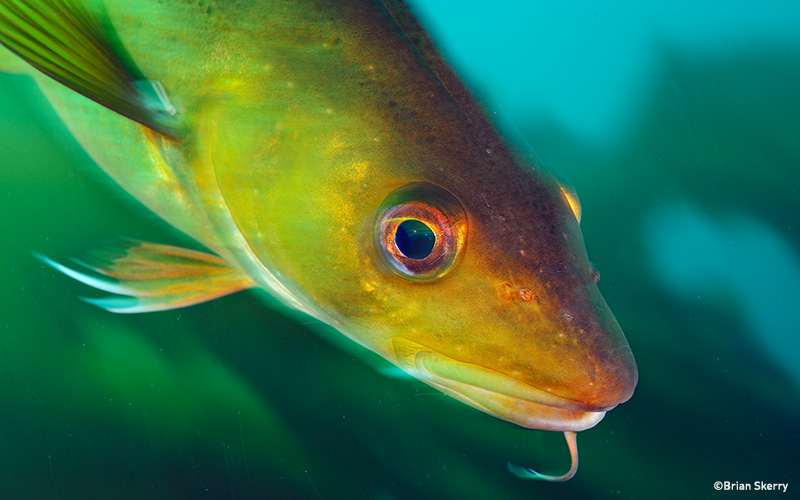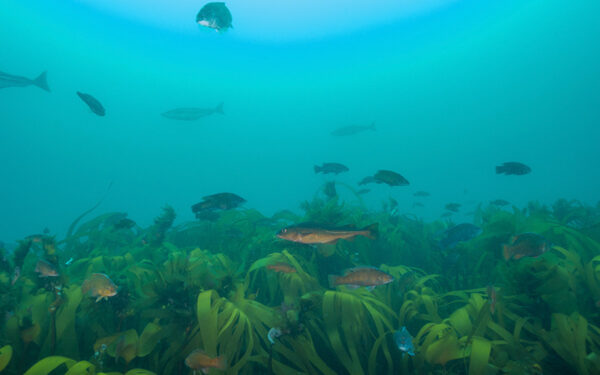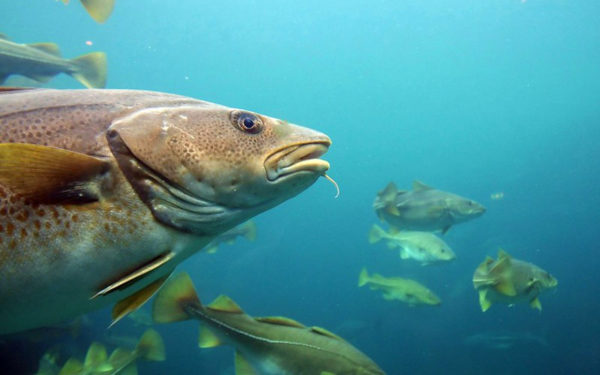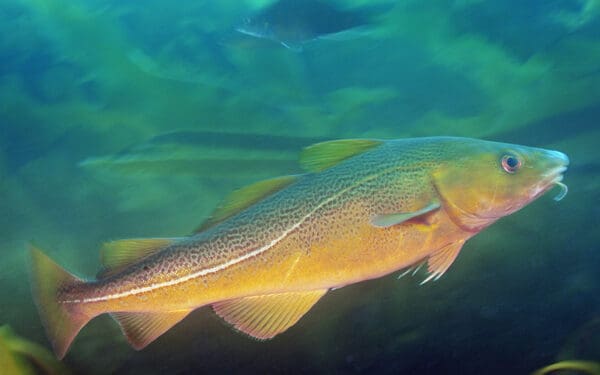
The climate crisis is creating new challenges for Atlantic cod, but the first step to give our founding fish a chance against a waming ocean is to improve management. Photo: Brian Skerry
This is part three of a three-part series on the current state of Atlantic cod in New England. Part three explores how a warming ocean is making problems caused by poor management worse. Read part one about the challenge of inaccurate data here and part two on decades of bad management here.
The climate crisis is rapidly changing our environment all across New England, but the impacts are especially substantial in our ocean. The Gulf of Maine is one of the fastest-warming bodies of water on Earth. For Atlantic cod, already devastated by overfishing, our changing climate makes a bad situation worse.
Atlantic cod is managed as two populations, or stocks, in New England waters: Gulf of Maine cod and Georges Bank cod. Poor management decisions by our regional and federal fishery managers have led to overfishing of both stocks for decades. Managers have repeatedly chosen short-term economic gains over long-term population health and conservation.
These poor management decisions are compounded by a lack of good data about what’s truly happening on the water. Current low quotas create an incentive for fishers to throw back cod caught incidentally alongside more abundant fish with higher quotas like haddock. These illegal discards aren’t counted in our estimates of how many cod are being caught, throwing off population estimates and calculations of sustainable catch limits. Current programs to monitor illegal discards aren’t working.
These management problems have put cod on the brink of collapse. Now, climate change is causing further damage.
Where the Cod Are – and Aren’t
Atlantic cod generally prefer water that’s cooler than 53 degrees Fahrenheit. That puts our New England fishery near the southern, warm end of their range.
Now, as our waters heat up, the parts of our ocean cold enough for cod to thrive are shrinking. Atlantic cod, along with many other species, have started to move farther north and to deeper offshore waters in search of cooler temperatures.
This creates new challenges for fishery managers and scientists as they attempt to rebuild overfished stocks like cod. In the long term, management will need to confront these shifts.
Warmer Waters Threaten Next Generation of Cod
A warmer ocean also makes it harder for Atlantic cod to reproduce and raise healthy young fish. Again, management decisions have put cod in a precarious position that climate change makes worse.
Compounding overfishing, management has failed to fully confront the current low birth rate of New England cod. Scientists have warned for years that both Gulf of Maine and Georges Bank stocks produce too few young. They also have too few old fish. It’s a catch-22 problem – older female cod (which scientists colorfully call BOFFFFs or Big Old Fat Fertile Female Fish) lay exponentially more eggs than younger cod. But those big old cod, once abundant and the stuff of legend in New England history, have been fished almost out of existence.
These issues would be challenging for cod under normal circumstances. But in the face of climate change, it spells even more trouble for their future. Scientists are working to understand precisely how warmer temperatures may harm cod reproduction, growth, and survival, and the degree to which the warming ocean is limiting population growth.
Protecting Spawning Grounds Are Part of the Solution
Cod, like so many other animals, return to the same places year after year to mate. They have surprisingly complex spawning behaviors, complete with elaborate courtship rituals, that typically tie to specific locations. Fishing disrupts these behaviors, on top of which gear like bottom trawls physically destroys the habitat. Along the New England coast, most of the historic spawning grounds have been wiped out. Only a few remain in the whole region.
For cod to recover, we must protect important cod habitat – particularly areas where we know they spawn. This isn’t a new idea. During colonial times, Massachusetts laws shut down the cod fishery during their spawning season. Today, the fish still need refuge sites where they can feed, spawn, and develop without disturbance.
The Gulf of Maine cod stock, in particular, is reliant on just a few remaining spawning grounds, which need to be protected for the entire spawning season. By setting aside places and times where commercial fishing isn’t allowed, we can ensure spawning fish are protected and help the population rebuild.
Cod Need Better Management to Survive a Warming Ocean
It’s simple: cod are in crisis. Decades of overfishing got us into this mess, and now climate change will make it even harder to get out of it. While it may seem easy to blame climate change for the unhealthy state of cod, it’s just the last straw on top of decades of overfishing and mismanagement. Of course, we all need to do our part to curb emissions and slow climate change. Fishing pressure, however, is directly controllable and the first step toward rebuilding cod. The realities of the climate crisis make sustainable management even more necessary.
Just across the Atlantic, effective management has helped overfished North Sea cod recover despite warming ocean temperatures. With vigilant management and sustainable fishing rates, the population has been improving – and with better management in New England, our Atlantic cod can too.
We need new, strict, and effective management measures to ensure the future survival of New England’s most iconic fish. To give cod a fighting chance against climate change, the first step is to improve management today.



